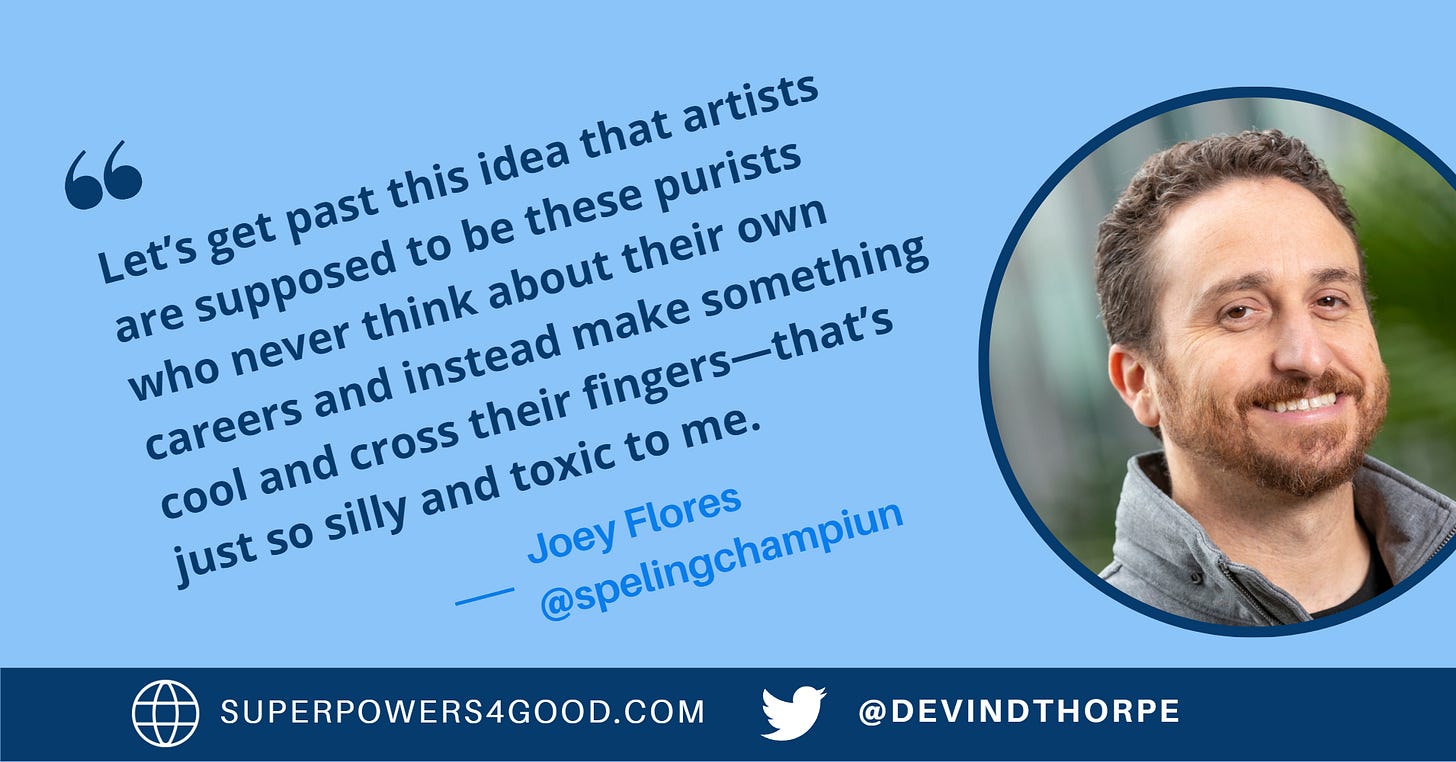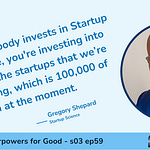Devin: What do you see as your superpower?
Joey: I am equal parts left brain and right brain. I’ve been an artist my whole life in one way or another. But, I stumbled into a career in business and have sort of always excelled at whatever I wanted to do, whether it was creative or whether it was business.
Joey Flores founded Inversion Art to become the Y Combinator for fine artists.
Joey founded a business in 2010 and qualified for the Y Combinator accelerator program the following year. After growing and selling the company in 2015, he credits Y Combinator with providing him with a life-altering experience.
The Inversion Art program invests in fine artists by purchasing some of their works. The company plans to hold the art for five years as they cultivate the artists’ careers, hoping to sell the pieces at enormous profits.
“These are fine artists whose works we believe may eventually end up in museums worth millions of dollars,” Joey says.
“We invest in them by buying artwork from them—a significant amount, an amount equal to 30 percent of what they earned last year,” he says. “So, if an artist made $200,000, we’re going to buy $60,000 worth of their artwork, which is probably three to four pieces.”
The three-month accelerator program helps them strategize the next three-to-five years of their careers. At the end of the program, the team introduces the artists to curators, collectors, gallery owners and other professionals. “We’re trying to get these artists next-level opportunities,” Joey says.
A vital element of the program is that Inversion Art will manage the back-office functions for the artists in exchange for 15 percent of their revenue. “They need to be focused on their creative work,” he says. “So, we just take all of that off their plate.”
“We expect anywhere from 5 to 15 percent of our artists to do it incredibly well and ultimately return big profits to the organization,” Joey says. “But the goal is that all of them are able to sort of have long careers, be working in fine art as long as they want, achieving the goals that they want for themselves.”
Joey is an artist himself. “We created a ten-piece funk, jazz and hip hop ensemble—a vibraphone, trumpet, trombone, sax—a huge group, very jazzy, very funky hip hop rock. I mean, it was really eccentric.”
The band saw some genuine success. “We recorded a full-length album. We were selected to open for Arrested Development at the Colorado Music Summit in Denver,” Joey says. “We had created a good album. We had fans; we were selling plenty of tickets for shows in LA. Our CD release party was completely sold out, but we just could not market this stuff at all.”
“Everybody we talked to was having the same problem—all the bands just having trouble with marketing,” he says. “We ultimately ended up coming up with an idea for a tech platform that would help musicians with marketing.” They created Earbits, the business Joey took through Y Combinator in 2011.
When they sold the business in 2015, they had 15,000 bands and 600 recording labels using the Earbits.
That duality in Joey’s nature, the business-like creativity, is the superpower he has leveraged for success in his career.
How to Develop Business-Like Creativity As a Superpower
Joey’s artistic creativity helps him in business, often in marketing. Remembering that raising money is essentially a marketing task, it has proven critically important in his career. “My superpower is just being like half artist and half business person, probably maybe more like 55 percent business person and 45 percent artist.”
Looking back, Joey sees the investor pitch experience, including building the pitch deck he used successfully with Earbits at Y Combinator, as a primary example of using the artistic creativity side of his brain to significant effect in business.
He points out that the investor pitch is a form of storytelling. “You’re literally creating a picture book for investors about the company.”
As Joey prepared to pitch on demo day, the advisors guided him to follow the formulaic, tried and true script for the pitch. “I knew that that was not going to work for us because of the toxicity of the music space from a venture capital perspective.”
“We only had, I think, two and one-half minutes to pitch. I spent the first minute and a half explaining this story about meeting my co-founder, putting the band together, having problems with marketing and coming to a conclusion that the solution to our problem was X. Then I said, ‘We do X.’ Everybody got it.”
The ultimate reward, on top of raising the capital they needed to grow the business, was the feedback from one of the advisors who had encouraged him to follow the tried and true path. Joey recounts his reaction to the presentation, “I owe you an apology. We heard yours was the best pitch of the day.”
Joey offers some advice to artists. “Let’s get past this idea that artists are supposed to be these purists who never think about their own careers and instead make something cool and cross their fingers—that’s just so silly and toxic to me.”
Instead, he suggests artists need to think of themselves as entrepreneurs who make products. “If you want to do this for a living, you need to think of it as a business.”
On the other hand, Joey advises developing and using greater creativity in business. “Nobody should expect that they are going to be super creative right out the gate. It’s a muscle you have to flex. It’s important for entrepreneurs to flex it.”
You can strengthen your business-like creativity, perhaps even make it a superpower that enables you to do more good in the world, by following Joey’s example and counsel.














